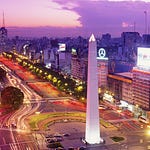In this week’s Fatal Conceits Podcast, we’re joined by globetrotting editor of the Real Estate Trend Alert, Ronan McMahon...
If the past few years have taught us anything, it’s that the “new normal” is unlikely to look anything like the “old normal.”
That goes for the financial world as much as it does the job market and practically everything else about the way you live, work and even spend your leisure time.
The “Great Covid Interruption” (and the governments’ responses to it) accelerated a nascent trend away from congested, overpriced, high-crime metropolises toward remote work and retirement destinations… many of them overseas.
Just as Californians and New Yorkers are ditching their overtaxed, over-regulated, over-mandated home states in record numbers, opting for relaxed and rural alternatives, so too are Americans and Europeans in general looking beyond their own borders, wondering…
“Could I enjoy the same – or even better – lifestyle on the Riviera Maya… or Los Cabos… or Portugal’s wild Costa de Prata? And could I do so… for a fraction of the cost?”
With inflation biting big time at home… and self-serving politicians looking to tighten the screws further on honest, working folk… maybe it is time to look for a better way?
We caught Ronan mid-migration, en route from Mexico’s Baja Peninsula to his summer residence in Ireland. What this man doesn’t know about international real estate opportunities is simply not worth knowing. So whether you’re looking to invest some time and/or money abroad… or you just want to escape the rat race for an hour and imagine yourself on a white sandy beach with a margarita and a good book, this episode of the Fatal Conceits Podcast is for you…
Saludos!
Joel Bowman
P.S. For readers interested in learning more about Ronan’s work, you can access a 100% risk free trial of his Real Estate Trend Alert service for 90 days, right here…
As always, go right ahead and drop any comments… including YOUR favorite overseas destination (and why it is so)… in the section below. Also, feel free to share our humble podcast with globetrotting friends and desk-bound foes alike, here…
TRANSCRIPT:
Joel Bowman:
Welcome to the Fatal Conceits Podcast dear listener, a show about money, markets, mobs, and manias, not necessarily in that order. If you're a first time listener or you are joining us once again, please do head over to our substack page, that's at bonnerprivateresearch.substack.com. There you'll be able to find hundreds of articles and research papers on everything from high finance to lowly politics, and plenty more besides, including many discussions under the fatal conceits podcast section, just like this. And for today's episode, I'm delighted to welcome back. One of my very favorite guests, a long time personal friend and friend of the Bonner Private Research family, a man with I think possibly the coolest job title in the world that is International Real Estate Scout. Please welcome Mr. Ronan McMahon. How do you do sir?
Ronan McMahon:
Joel, lovely to be here as always, doing good.
Joel Bowman:
Fantastic. Now mate, last time you and I spoke, if you'll recall on this podcast, I was in your sometimes hometown of Cabo San Lucas on the Baja peninsula in Mexico. And you were in, I guess, one of your other sometimes homes on Portugal's west coast. Where do we find you today?
Ronan McMahon:
I'm talking to you today from an Airbnb in Guadalajara-
Joel Bowman:
Of course, you are.
Ronan McMahon:
Of all Places. I did just to kind lower the sexiness of it. I'm not quite beachfront. I'm looking out at beautiful flowering, Hacienda trees, but I'm making my way east, my eastward migration from Cabo San Lucas to Ireland to Portugal is underway.
Joel Bowman:
Okay. Yeah, we were mentioning just before going on air here, that we're both in the midst of packing for our seasonal migrations. For listeners who are unfamiliar with your no air condition and no heating rule that you've imposed upon your life, do you want to give us your migratory pattern of an International Real Estate Scout?
Ronan McMahon:
Absolutely Joel. So the maybe starting where I'm now in terms of this block of the year, summer is in Ireland. I'm Irish as you well know, I like to take that high summer in Ireland where we've got these long summer days until 10:30, 10:45 at night, everything is green, everything is beautiful. The weather can be okay. It can be mixed. I don't really mind if it's rainy because I'm coming from sunny, Mexico, and I've got my fix of sun. Then typically both shoulder seasons, spring and fall. I like to be in Portugal. It's actually the silver coast that stretch of coast, north of Lisbon, amazing big wide, long sandy beaches, kind of wild Atlantic weather, but it's warm and it's pleasant and I'm right on a beautiful beach and on a great ocean front golf course in Praia del Rey, and got wide open spaces, great food, really, really special place to spend time.
And then my winters are in my home in Cabo, San Lucas, Mexico. So there again, I get these beautiful winters in Cabo where it's kind of mid seventies, low eighties, nearly always t-shirt, but often it's long pants in the evening. So following that route, I learned a couple of things Joel when I started traveling, first is weather and at this very conditions are very important to my overall sense of wellbeing. I had asthma, and a mild asthma, when I was young I would've told you it wasn't a big deal, but then when I moved to a low humidity place or spent time in a low humidity place, like Cabo San Lucas, I started to realize, geez, I really, really feel a lot better with this sunshine and low humidity. And I also don't do well in heat. That's the Irish boy in me.
So I found life is a lot better when I just move around and follow both weather conditions and places that agree with me. And along the way too, I'll get to scratch a lot of those itches. I mean, I love to live in places that are really quiet and have the sense of isolation while being relatively close to an international airport. But I also like to get my big world class city fixes. So I think no year is complete without some time in London and Paris and so that's how I like to organize and work and do my research and do my deal making along the way as I go.
[Ed. Note: Learn more about Ronan’s Real Estate Trend Alert, and how to start your own 100% risk free trial, right here.]
Joel Bowman:
Well, I want to get into that work that you're doing and that you've been doing, of course, with Bill Bonner, for goodness, as long as I've known you. And that Bill has been doing since going back, I guess, to the seventies, with the founding of International Living, but just right off the top, it seems like just such a kind of bond spy-esque, existence, just sort of cruising from one place to the next. But you've spent the better part of your career showing people how actually to do this and actually sort of where the rubber meets the road with regards to how they can potentially make that happen in their life. But I wanted to just go back to one point that we mentioned in our last conversation on this show, and that was over the past few years, there seems to have been this catalyzing event with the sort of the global pandemic and people have been locked in their homes for a long time.
And now it seems they've gotten out the world is just beginning to start opening up again. They're starting to look over the back fence and reimagine themselves on these sort of grand tours, if you will. But I think one of the points you brought up last time was that a lot of people who had been living in very high price cities, maybe San Francisco or Chicago or New York, came to find that actually, they weren't really getting the bang for their buck with regards to rent, let's say San Francisco, I think it's the highest in the U.S. at some astronomical figure, but it did seem like the pandemic catalyzed a bit of an outflow from those cities. There were, of course, these famous zoom towns and people commuting to work.
I know there was a lot of talk about that trend reversing, or maybe even just contracting in the wake of the pandemic, but it does seem like people who got a bit of a whiff of freedom are reluctant to give that up. And that maybe actually, this is the beginning of a kind of reverse migration from those big cities that people are now trying to get out of. Does that resonate with you and your experience?
Ronan McMahon:
I mean, first of all, Joel, I would say straight up, you will have heard no talk from me of reversal, not for a second. And secondly, this has been the... It's a big acceleration rather than something that COVID has triggered. So let me right back to the start because you're scratching on something here that is so integral to the way the world is changing, it's so integral to the opportunities that we have in terms of how we organize ourselves, and so integral to investment opportunities. So first of all, this was happening anyway. So over the last 10 or 15 years, just this thing of remote work, remote managing a business, remote and enjoying your retirement. That was really, really becoming a thing.
I was seeing just the explosion of beach cities, like Playa del Carmen in Mexico, or Lagos in Portugal. So this is all happening anyway, and along the way, there have been a few kind of accelerating events. And it's really interesting to look at these accelerating events because they might surprise you. So one accelerating event was the last crisis, the great financial crisis followed by the Arab spring and instability in the Middle East and North Africa. So I think a lot of people perceive these jolts to the system as somehow leading to stagnation. But what it really means is that the people who are in a position financially and in terms of skills get out. So the great recession, the last financial crisis, upended things, people moved to where... It just challenged everything.
So people moved to places like the Costa del Sol in Spain, and they figured out how to make a better life for themselves. And likewise, with the Arab Spring, now this is for a very different type of group, but I think it's a really, really interesting example because all that instability led to an influx again, into places like the Costa del Sol in Spain and Paris. So when the system gets shaken up, what happens is people reassess. So before COVID, we had been seeing this it was almost like a rough run, people left... Maybe that's an inappropriate analogy, but the people left San Francisco, because it was too expensive and too this and too that and to the other thing, and they moved Austin. And then from Austin, they were moving to Tulum or to Panama or to Lisbon. And then COVID hit and everything goes up in the air and people are going straight from San Francisco to Cabo San Lucas or Tulum.
Even though people are flooding into Austin as an example, many, many people are also leaving and going to these other locations. During COVID, we saw how older people were less inclined to travel. Since things have started opening up and freeing up, they're traveling in great numbers to enjoy their time and enjoy their retirement. I'm seeing more and more of these places, these very desirable places to spend time. Think about living in your dream beach city, you've got pristine white sands, you've got the best restaurants imaginable, you're surrounded by a group of like-minded individuals, your accommodation, and all your costs of living are a quarter or a fifth of what they're in in San Francisco.
These places are developing into their own ecosystems with their own startups, with their own vibrancy, with their own energy. This genie is not going back in the bottle. Now, Joel, that's not to say people won't return to offices to some extent, and that's not to say that every company will be remote or stay remote, but just remember the have a dramatic impact on places like Cabo San Lucas are like Lagos in Portugal. It just takes a very, very small percentage of San Francisco tech workers or New York bankers, it just takes a very small amount to them to really, really move the needle. And this is creating maybe the biggest investment opportunity of my lifetime in places like, these places I'm talking about.
And I'm thinking particularly about kind of Cabo San Lucas as I speak with you because tomorrow we open a new opportunity that's members only to my group of real estate investors. And in Cabo San Lucas, we've just seen incredibly fast rates of capital appreciation from our members only deals. And we've seen rental rates more than doubled since pre COVID. So it's been a great opportunity in terms of financially for us to be able to tap into these trends too.
Joel Bowman:
Yeah, that's fantastic. And I'll include a link to the work that you do at Real Estate Trend Alert in our transcript here. (See Ronan’s RETA service here.) When you and I was speaking about Cabo San Lucas and I was ironically there and you were in Portugal at the time, one of the things that struck me that you had observed, and this is speaking as a, I won't say a young father, but the father of a young daughter is that when people move to these... To work remotely in places like Cabo and places like in, on the Maya Riviera, et cetera, or in Europe, they bring with them a certain demand for example, education for their kids. And you were seeing small communities of generally like-minded individuals, young professionals with elastic salaries that were now going a lot further.
Those people were starting to demand on location, education for their kids, which I know for a lot of people a lot of my friends in the U.S. are paying through the nose for what they're increasingly finding out is substandard education or indeed indoctrination for their kids. And as with people who are starting to work remotely, people who are living remotely are quickly realizing that for a lot less pennies on the dollar, they're able to afford some help around the house, a nanny, a private tutor, piano lessons, all this kind of stuff that would've just been absolutely impossible had they stayed at home, but that creates a whole sort of sub economy that's very vibrant in places like Cabo. Would you agree there?
Ronan McMahon:
Absolutely. And I mean, this exists at every level. You take you as a father of a young child you're thinking about the various infrastructure that goes with that. Maybe you're an avid golfer and you realize that now you come here and you need golf lessons, or you're a tennis player, and you need tennis coaching followed by a massage and you like certain types of food. And all this is just people and ideas in a mobile virtual world, people and ideas are the resources that make an economy kick. So not only do you have, and do you develop that service infrastructure, nannies, kindergartens, accredited schools, universities, all this stuff, but you also find that ingenuity starts to get transferred.
So for example my team is dotted around the world. And now I see for example some of my team is based in Medellin in Columbia. So now we need to get tech consulting services, close to that person and close to that little team. So now we're going out a level in the ring because it's more convenient to have our tech consultants close on hand to that person. It's easy for them to connect and collaborate on certain things. So now these little pods, so where I maybe had two team members, now maybe they have another four or six people supporting them and providing frequently very, very high level services. And those services are priced at a global market price because all those people are selling their time and selling their ideas and selling their brain power into a global market. So it's transformational what this brings to a lower wage economy when all of a sudden you've got this cohort that are earning at U.S. levels.
Joel Bowman:
Yeah, there's a huge opportunity there and having lived abroad myself in the middle and the far east and down, down here in south America, I think when we spend our childhoods in one country in, be that Europe or in the U.S., or in Australia, in my case, we get used to a certain type of market and forget that it's a big, big world out there. So speaking of which one of your mantras, I guess, or one of your sort of guiding principles when it comes to looking at places around the world to invest, and you've mentioned a few of them here is this idea, this path of progress idea. And I wonder if you could just take a second just to explain that what you mean by that, and then we can get into some places that potentially you're looking at presently.
Ronan McMahon:
Yeah. Exactly Joel. What I see as a path of progress event is something that makes a place and typically in my context, it's a place that's very beautiful, very attractive. Something happens that all of a sudden makes that accessible. So historically, that's been big infrastructure event. A new airport comes to a Caribbean island, a new bridge connects two areas. So big infrastructure projects that made beautiful places that were historically difficult to get to much much more accessible. So the big examples of this I like to use Mexico's Rivera Maya as the classic example, because this is the stretch of coast that starts out of Cancun and goes down to Tulum, those pristine white sand beaches. And there was nothing there, go back to the sixties, there was, I mean, literally nothing. A few Mayan villages in land, but nothing on the coast.
And then the Mexican government through their tourism promotion body came up with the idea of creating a tourism destination. So they built Cancun airport and built the infrastructure for a hotel zone. So this was like a master planned tourism event. And then from there, they built roads. So first Cancun developed, it developed, thanks to that improved air accessibility, then they built a highway to Playa del Carmen, development followed, and then onto Tulum. So it's typically these big infrastructure events that improve accessibility. Now, that idea of this being infrastructure driven, I'm really broadening it out over the past couple of years to include things like technological developments that allow for remote work just these big changes that support and accelerate these trends.
Joel Bowman:
Yeah, that's very interesting. I was speaking with our mutual friend Will Bonner, Bill's son when he came to visit his dad up in Salta and we traveled around... And this is in the Northern reaches of Argentina for our listeners and where Bill has some property and he, and Will run a wine partnership up there. Very remote part of the world, really arid kind of Luna-esque landscape in many ways. And that's part of the reason that they have their wine partnership up there. This really extreme altitude vineyards and extreme conditions for growing grapes.
But it's very interesting, he was mentioning that, or one of our co-travelers was mentioning that the Saltan government had some conversations or some inroads with setting up Starlink internet access up there, which is this decentralized very, very futuristic sounding private internet satellite connections. Which when I think about something like that it going back to the sixties, it was, you had to land an airplane on a strip somewhere to bring people and bring opportunities to a place like Cancun. Now we go to somewhere it's that this is about as remote as you can get up in, on the Bolivian, Chilean border in far Northern Argentina. And we walk around and we see kids in cafes on their laptops doing their business. It's this sort of progress. It almost feels like the whole world is opening up. In that scenario, how do you pinpoint one particular place over another when something like a tech expansion or liberation feels like it could be just super ubiquitous.
Ronan McMahon:
And just the other thing too, Joel, that's going on is that the governments right across the world are competing for us. There is just now this succession of golden visa programs, remote work visas. Governments right across the world are looking to attract in mobile people. So it comes down to, and so just, how do you pinpoint the next areas that are set to explode? For me, this is really, really easy right now, because what we're talking about is a mass acceleration. So there's this variety of places that have proven themselves free acceleration to be the most desirable places for remote workers, for mobile people, for retirees, for this whole cohort, which it's very interesting that can exist so seamlessly side by side, because you say digital nomads, people might have some preconception, but you go to a place like Playa del Carmen in Mexico, and you have young trendy, digital nomads, you have young families, you have older retirees. These places broadly have the same kind of basket of things that are appealing to everyone.
So our strongest opportunity in terms of tapping into this is to go with places that have already proven themselves pre COVID, pre mass transformation, that's number one. And secondly, look to their hinterland and to see where the next places in proximity, where is the overflow going to go? So to give an example and I'm, again I've just been the past few months in Cabo, and that's where I've been doing a lot of research and scouting, but Cabo are the lost Cabos area of Mexico. Let's say Cabo San Lucas and San Jose del Cabo. That's had this massive explosion fueled by a range of things, including all this stuff we've been talking about, plus improved air accessibility.
Now, on the margins of that, there's this whole bucket of new places, okay. So Cabo San Lucas has been this like, well established Uber luxury destination for decades. In the last couple of years, development has been moving along the coast to Pescadero and Todos Santos. I predicted transformation of both Pescadero and Todos Santos five years ago, now those two areas and Todos Santos is a Pueblo Magico, Pescadero is an area 10 minutes closer to Cabo San Lucas that's got an abundant supply of water. So it's attracted all these really cool foodie destinations. But those places you've got, let's call it the overflow. And I'm hesitant, it's quasi overflow, but it's also that the pioneers who came there 10, 20 years ago all of a sudden Cabo is too mainstream, too many big box stores, too many of all these things that are attracting maybe the more conventional, practical people. Next thing, the pioneers are going an hour down the road.
So outside of Cabo, we're seeing this transformation of the Baja I've just come from La Paz, which is the state capital of Baja, California Sur. And that's this beautiful sleepy kind of seaside town with the lovely Malecon. And it is just exploding with new restaurants, just this vibrancy in the foodie scene, new boutique hotels, new niche developments popping up all around. So the Todos Santos and Pescadero are along the Pacific coast that runs north of Cabo San Lucas. You go east of Cabo and you hit the east Cape, and that's on the Sea of Cortez side. And again there, there's all this new funky stuff happening. Some of those beach towns to the east of Los Cabos like La Ventana, they feel like Tulum on the Caribbean side of 15, 20 years ago.
So the way to play this is to back the horse, that one in a more challenging environment, that's step one, that's the most solid play. And then the more speculative play, if you want to get out ahead of the next trend, find the places that's one step removed, one step away from that proven place. And you can take wild speculative hunts on, let's say an Albania, for example, I could make a very compelling argument for why Albania might be very much worth looking as a speculative long term punt. But then I think to myself, why would I bother looking to Albania when I can look two hours north of Cabo San Lucas, where I literally can look two hours north of a market where the average nightly hotel rate is $455, where a significant portion of the tourist industry is the luxury segment with nightly rates starting at 1500 bucks a night, where you go in through the airport and you see everything from new budget airlines to the most congested, private jet parking lot I see everywhere.
So that in my view, Joel, we can look to kind of very speculative upsides in a way that's very low risk by following that strategy.
Joel Bowman:
Yeah. So interesting that you mentioned Albania, my wife and I were there, what would've been maybe 10, well, eight years ago say, and we were at the very Southern tip there just right on the Greek border at a little place called Butrint. And my wife is an avid classist and has her own classics website, classicswisdom.com., if you want to head over and check it out. But we were there on a, just on a whim it's very difficult to get to. At least it was at the time. You had to go... You couldn't cross over the border from Montero, you had to sort of zigzag ferries up and down the Adriatic, and we ended up getting a taxi to take us over the Greek border. And went on a floating bridge, and there was a mule ride. At some point it was very, very off the beat track, but once we got to the beach, my goodness, it was just a little slice of paradise.
And there was an old ancient ruin there that was said to have been Odysseus's first stop on his way home from the Trojan war. It was all very, very interesting. And we had the place practically to ourselves because there was literally, nobody had heard of it. And Albania of course, had been such a hermit kingdom for so long that it was... It very much felt that we were off the beaten path and maybe the opposite of Corfu or something where it was just a more regular open to practical travelers, shall we say. But it's interesting that you remark on Todos Santos and places like this.
I've been thinking for many years that it's these little in the knowledge communities who are going a little further beyond who discover these things. And I'd heard about Todos Santos many years ago, having grown up as a surfer because of, as you, of course know, it's been and long been a big destination for big wave surfers off the west coast there. And it's interesting to see now these people coming in and putting tennis courts in and infinity pools and that's in the next wave of progress, but it does go to show that you really need to be amongst those circles, talking about these places, getting your boots dirty, doing the investigative and scouting work that you do, because it's oftentimes within those small communities, just word of mouth where you hear about the next thing that's taking off.
I wanted to ask you about Tulum on the other coast, because I know you've been doing some workout there, and then maybe sort of get into exactly what kind of opportunities it is by way of construction and investment and pre-construction deals you're able to leverage for your readers and into a bit of the nuts and bolts. But I guess just selfishly I'm very intrigued by what I've heard about Tulum recently. Can you give us a bit of an insight there?
Ronan McMahon:
Yeah. And just when you mention surfers too, Joel, I think of Nicaragua and I think of how the first of international visitors were those avid surfers who crossed the border from Costa Rica. Costa Rica gets discovered, Northern Costa Rica becomes moderately busy. Again, those people on the frontier on the edge, they're looking for the next place. You just see this time and time again, the artists, the French and Italian cooks, you just follow these types around because they're only looking for the best. So they're mobile, they'll go wherever is best. And they, different groups unlock are they both find, and then they also create some of these transformations because a lot of these transformations come about when a certain community brings a certain design sense or something to a neighborhood and triggers a gentrification.
And Tulum is just one of those places where you just have this like 13 kilometers of just absolute pristine beach. You have got an area of town around, along the beach that backs the beach, and then you've got Tulum town itself, which is vibrant and diverse. It's just incredible to just see the transformation within Tulum. Yeah, I remember it's probably just a few short years ago, popup restaurant. So Tulum was the place when Bill created international living, the very first issue of international living in 1979, I believe was about Tulum. And Bill rode about finding naked hippies frolicking in the beach. Now, there's still hippies and partially clad hippies, but there's a type of-
Joel Bowman:
Now there's highly paid models.
Ronan McMahon:
And there's the types of hippies who are paying $1,500 per night to stay in a beach house.
Joel Bowman:
Right. I'd take a piece.
Ronan McMahon:
Yeah. So like, I mean, I for a long time, every time I'd go, I'd send Bill a photo of a kind of line of hipsters queuing up to have dinner in one of these trendy restaurants. And Bill was blown away that this was Tulum. And then he came down there with me just before COVID became a thing for us. So I guess, February of 2020, but it is just this pristine, beautiful beach, for me, it's the nicest beach on earth or one of the nicest beaches on earth, certainly that top, top, top tier, and you just have this amazing experience of great food, great beach, people bike around the place.
It's just very funky and very vibrant and just really, really beautiful. And then so much to do around because you've got ancient Mayan ruins on the cliff, you're a short drive to Coba, which is this Mayan ancient Mayan city. You've got Cenotes which are these kind of these sinkholes so the whole peninsula is built on limestone. So over the centuries, some of these have just collapsed into giant holds that just leave these beautiful, fresh water kind of sink holds or lakes with caves. And it's just really, really beautiful and a very, very special and vibrant and diverse place.
And it's created a huge real estate opportunity just for all those reasons that we've talked about. And investors who've got in have, have done extremely well and will continue to do extremely well as those both long term and short term rental rates increase.
Joel Bowman:
Yeah. I bet I'm cognizant of the fact that I'm sure our listeners realize in both yourself, Ronan and myself, that we're wonder lost people. And we could rhapsodize about exotic places around the world, probably for a lot longer than we've got time for on this particular show. But I wanted to get to exactly how investors, whether or not they're people who want to spend a significant portion of their time, let's say, and actually physically be in one of these many places that we're talking about, or if perhaps they wanted to place sort of a, put some capital down and invest in something along the risk profile from steady high rental rate security to perhaps something more speculative at the other end, how your Real Estate Trend Alert can help identify opportunities for them and get them started on one of those paths.
Ronan McMahon:
Yeah. So I guess, Joel first of all, the research that I do along with my team, because again, it's a very, very big world. And since I've founded Real Estate Trend Alert way back in 2008, I've realized that it's a big patch of ground. We have to cover. So the more help I have the better, but we pan out across the globe and we find places that are set to be very, very strong beneficiaries from these big trends that we're seeing. So the first thing people can do is invest in those recommendations. So for example, five years ago was a, what I would call a macro recommendation, which was to buy land or homes in a certain neighborhood of Todos Santos. And that's a scenario where I've identified the place that's on the up. And I've explained to readers what I see as the best way to profit from it.
The next step where it becomes, I guess, more easily actionable for readers is where I sit down with the developer and I use our group buying power to negotiate special members only pricing and terms on the deal. So for example, tomorrow in Cabo San Lucas, we have a new members only deal that's opening up. We get to buy ahead of this deal being announced to the general broader and local market. We get to pick the best inventory and we get a very, very significant discount on what the developer will charge to everyone else. So the benefit of that is we get the benefit of the group buying power, because I invest along with my fellow RETA members in many of those deals in fact, in this Cabo deal tomorrow, I plan on buying two condos.
We get the benefit of our combined group buying power because when I sit down with the developer, I can get a pricing based on us taking a big number of condos. Maybe it's a hundred condos rather than just getting a price on one condo for myself. And then secondly, we also to get to leverage me and my teams research, identifying the best neighborhoods and very, very importantly, the best developers to work with. Individually, every RITA member should absolutely do their own due diligence, but we certainly do a lot of the grunt work and provide a lot of the filtering out of the people that you certainly don't want to be doing business with. So there's the macro research that you can just take and figure out your own land deal yourself, or we'll introduce you to brokers in many cases and you go figure out your pricing and do your own negotiation there, and then from time to time probably about eight times a year, we'll have a big member only deal. And that's what we have tomorrow in Cabo San Lucas.
Joel Bowman:
All right, mate. Fantastic. I'm looking forward to joining your group on one of these future joints, somewhere around the world, but I think before then, you and I might have a chance to catch up in Ireland. I'm going to be there for most of... Well, I'm going to be there for a short while at the end of June. I'm not sure what your movements are, but we might potentially be able to sneak in a pint of Guinness sometime along the way.
Ronan McMahon:
Would absolutely love to. And are you going to be circling back through Ireland as well?
Joel Bowman:
I'm not quite sure yet, where we've got a bit of a... It was interesting you were mentioning that so many retirees are now reentering the outside world again after the great interruption that was the past couple of years and my parents are among them. So they had a lifelong dream trip that they had planned to go to Scandinavia and check out the fjords in Norway. They had planned that trip for February of 2020, so obviously that got shelved and they were sort of waylaid in Australia for a couple of years. So anyway, they've now just embarked on that trip, long overdue. So my wife and daughter are I are going to go and meet them, check out the fjords and hang out with the grandparents for a little while.
The reason that we're coming through Dublin just, and my readers are going to hear a bit more than they probably want to hear about this, but I'm going to go to the birthplace of your kin, Mr. James Joyce. Of course, he has his blooms day celebration on June 16th of every year. So this is the Centennial celebration a hundred years since the release and publication of Joyce’s Ulysses. So geeks and literary freaks such as my own kind will be converging on your fair capital for June 16th celebrations and following in Leopold Bloom's footsteps. And again, my readers will hear way more than this, about this and than they want to, but that's the primary reason for going. We may circle back through depending on time constraints and some other things, but one way or another mate, let's make that Guinness happen either there or maybe well, we've got plenty of other places to catch up in the world too.
Ronan McMahon:
Absolutely. And my summer base is very close to you all. So I'm 33 minute drive from Bill and you all. So if you're taking a summer tea or a summer malbec under the big tree in front of his kitchen, which is a lovely spot to look down on the black water and the rolling Hills of East Cork and Waterford, that would be a lovely spot for us to connect and catch up there too.
Joel Bowman:
Oh, perfect. Mate, let's make that happen. Okay. I'm going to put a link to your Real Estate Trend Alert underneath, and Ronan as always. It's a real pleasure catching up, and I hope that our readers have enjoyed this virtual tour around the world and are looking forward to embarking on one of their own pretty soon. Please, to our readers checkout our Substack page once again, it's bonnnerprivateresearch.substack.com for many more conversations like this. Ronan, thanks you very much for your time. Catch you again soon.
Ronan McMahon:
Thanks, Joel. Take care.
















Fatal Conceits Podcast with Ronan McMahon